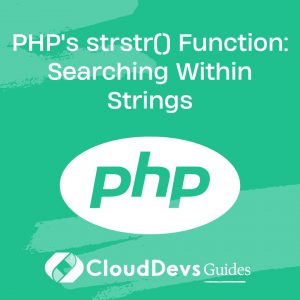PHP Q & A
How to secure sessions?
Securing PHP sessions is a critical aspect of web application security, as sessions store user data and credentials. Failing to protect them can lead to unauthorized access and data breaches. Here are essential practices to secure PHP sessions effectively:
- Use HTTPS: Ensure that your web application operates over HTTPS. This encryption protocol safeguards the data transmitted between the user’s browser and your server, preventing eavesdropping on session information.
- Unique Session Identifiers: PHP generates session IDs, but it’s essential to make them unpredictable and hard to guess. PHP’s default settings usually suffice, but consider configuring custom session ID generation if necessary.
- Session Regeneration: Implement session regeneration, especially after user login or privilege changes. This practice prevents session fixation attacks, where an attacker sets a known session ID.
- Secure Session Configuration: Configure PHP’s session settings securely. Set the `session.cookie_secure` directive to true, ensuring that cookies are transmitted exclusively over HTTPS. Enable `session.cookie_httponly` to block JavaScript access to session cookies.
- Session Timeout: Set session timeouts to invalidate sessions after a period of user inactivity. This forces users to re-authenticate if their session times out.
- Strong Authentication: Use robust authentication mechanisms, including strong password hashing and salting techniques, to verify users’ identities before creating sessions.
- Session Data Storage: Store session data securely on the server side, avoiding sensitive information. If necessary, encrypt sensitive data before saving it in the session.
- Protection Against CSRF: Guard against Cross-Site Request Forgery (CSRF) attacks by incorporating anti-CSRF tokens into your forms. This ensures that requests affecting users’ sessions are legitimate.
- Monitor and Log: Implement logging and monitoring mechanisms to track session-related activities and detect suspicious behavior promptly.
- Keep Software Updated: Keep PHP, web server software, and any relevant libraries up-to-date. This helps protect against known vulnerabilities that could compromise session security.
- Security Headers: Utilize security headers such as Content Security Policy (CSP) and HTTP Strict Transport Security (HSTS) to enhance overall security.
- Third-Party Libraries: If you use third-party session libraries, ensure they are actively maintained and regularly updated to address security issues.
By following these best practices, you can significantly enhance the security of PHP sessions within your web applications, reducing the risk of session-related vulnerabilities and protecting user data effectively.

Previously at


Argentina

GMT-3
Full Stack Engineer with extensive experience in PHP development. Over 11 years of experience working with PHP, creating innovative solutions for various web applications and platforms.



